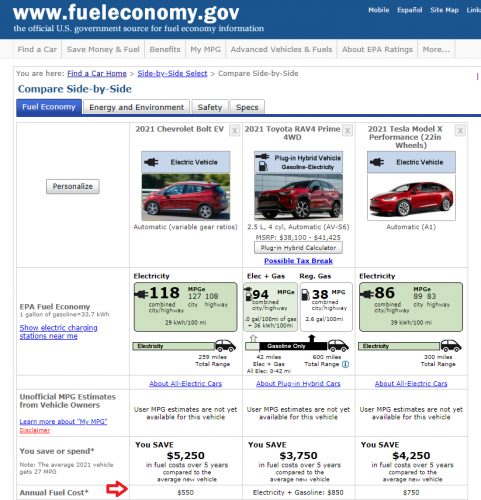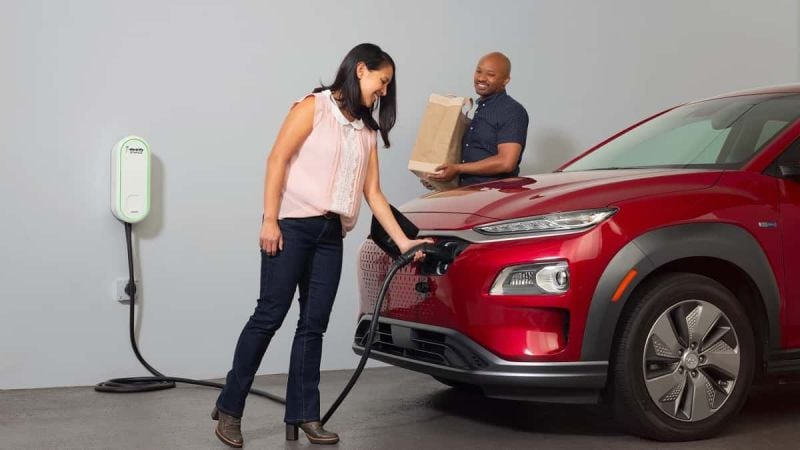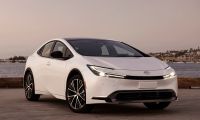Electric vehicles are entering the mainstream in 2021 with multiple brands now offering crossovers and affordable family-friendly vehicle designs that will appeal to many more buyers. This overview will help to answer some of the most basic questions about electric vehicles for those who are just now taking an interest in them. Our answers are not necessarily in order, but rather ranked by the questions with some of the most definitive answers to common concerns that might prevent a prospective buyer from looking deeper into EVs.

How Long Do Electric Vehicle Batteries Last? Are EV Batteries Expensive To Replace?
Every modern electric vehicle was designed with a battery that will last the entire life of the vehicle. EV owners don’t replace the batteries in the EVs they own. To help make customers comfortable with the idea of long-lasting batteries, manufacturers have added very long warranties on the batteries in EVs. Toyota’s is ten years or 150,000 miles.
The first green cars with propulsion batteries were hybrids like the Prius. Prius batteries commonly last well past 200,000 miles, and they are even repairable. Shoppers for new electric vehicles need not worry that the battery in the EV they purchase will need replacement during its normal lifespan.

How Long Does It Take to Charge an Electric Vehicle?
It takes seven seconds to charge an electric vehicle. That is the time it takes you to walk over to your home charger and plug in the car when you put it away for the evening, plus the time to unplug it in the morning. The truth is, almost every EV owner primarily charges at home. Our polls of owners show that even the majority of Tesla owners charge almost exclusively at home.

What Is The Range of an Electric Vehicle?
Most modern battery-electric vehicles have ranges over 250 miles. Some, like the Tesla Model S, have ranges over 400 miles. Plug-in hybrid-electric vehicles have a shorter all-electric range, but much longer total ranges. For example, the Toyota RAV4 Prime has an EV range of 42 miles, but a total range of over 600 miles.
If you don’t have a living situation where having your own EV charger or one waiting for you at work is possible, you should seriously consider a hybrid vehicle instead. Reliance on only charging away from home is problematic and requires lifestyle adjustments many who drive normal or longer distances are unwilling to make.

How Much Will My Electric Bill Go Up If I Buy an EV?
Most electric vehicle owners find that their monthly electric bill increases by about $30 to about $100 depending upon the model they choose, how much they drive, and how much their provider charges for electricity. For many EV drivers, the electricity bill can go up by 50% or even double. However, that added cost is more than offset for most drivers by gasoline savings. The EPA provides an estimated average annual energy cost for every EV at its website www.fueleconomy.gov.
What Is a BEV Battery Electric Vehicle?
A BEV is a vehicle that is powered only by a battery. The Chevy Bolt and Tesla Model 3 are among the two most popular BEVs.
What Is a PHEV Plug-in Hybrid-Electric Vehicle?
A PHEV can be plugged in, travel for many miles on electricity alone, and then reverts to being a hybrid until its next charge. The Prius Prime, Chrysler Pacifica, and RAV4 Prime are examples of popular PHEVs.
Related Story: 5 Plug-in Hybrid EV Myths Battery-Electric Purists Wish Were True
What Is An Electric Vehicle? Is There More Than One Type?
An electric vehicle is any vehicle capable of using electricity to power itself. The main types are battery-electric vehicles (BEVs) like the Chevy Bolt and plug-in hybrid-electric vehicles (PHEVs), like the Toyota Prius Prime and RAV4 Prime. In the past, hybrids that did not plug in were called “Hybrid-electric vehicles.” Most folks now just call those hybrids.

Plug-in hybrids are about to expand dramatically in the marketplace. Toyota’s Prius Prime has for many years been a top-selling EV. PHEVs have the ability to plug in and then travel a distance using only electricity. However, after their battery can no longer propel the car alone, they switch to being high-efficiency hybrids. The Toyota RAV4 Prime can travel up to 42 miles on electricity alone. Ford, Hyundai, Kia, Mitsubishi, and Toyota all plan to introduce new PHEVs in 2021. Many buyers of PHEVs buy them because they can also operate without needing to be charged on long trips. Trips of over 500 miles are possible without a stop in these EVs. PHEVs also have big advantages with regard to long-distance towing. Finally, PHEVs have been found to offer many of the same energy and maintenance cost savings that battery-only EVs offer. Most of the troublesome and costly maintenance has been designed out of today’s PHEVs.

Are Electric Vehicles Expensive?
New electric vehicles range in cost from the low $20Ks to well beyond $100K. Important parts of a new electric vehicle’s cost are discounting, federal income tax incentives, and state EV rebates. The Chevy Bolt is available in the low $30Ks in many parts of America due to Chevrolet’s discounting alone. In Massachusetts, a new Bolt will cost owners under $20K after the Chevy dealers’ discount and the state’s rebate is included.
With so many new EVs hitting the market, and a new Congress and President both committed to federal EV incentives, EVs are likely getting more affordable. Furthermore, cost savings from gasoline and repairs tip the cost of ownership balance in favor of EVs in many cases.
Are There Affordable Electric Vehicles For Sale Right Now?
There are many affordable EV models on sale in 2021. Start your affordable EV search with the Chevrolet Bolt, Nissan Leaf, Hyundai Hona Electric, Kia Niro Electric, and Hyundai Ioniq. If you consider “affordable” $40K, a Tesla Model 3 is within reach. Those looking for a crossover should consider the Toyota RAV4 Prime and Volkswagen ID.4. Both of these crossovers will cost most buyers under $40K.

What Is The Best Electric Vehicle?
For many who ask, “What is the best electric vehicle,” the answer starts with Tesla. This brand leads in EV sales. The Model 3 is a top-selling car, and the Model Y crossover does very well in its segment. For many buyers, the Model 3 and Model Y are the “best electric vehicles.” However, what you prioritize matters a lot.
If you want a crossover, the Toyota RAV4 Prime offers flexibility that Tesla cannot. Simple things like a spare tire and the ability to tow a trailer longer than 300 miles. And also technology like Android Auto and Apple CarPlay are offered by this model but not in any Tesla. Is performance your main interest? The Mustang Mach-E GT, Jaguar I-PACE, and some of the top-trim Teslas would be near the top of your list. If you prefer the security of a long warranty, Hyundai, Mitsubishi, and Kia top the EV charts. If reliability is your main concern, start with Toyota. Its green vehicles have topped the reliability rankings for decades. If you need seating for seven, check out the Chrysler Pacifica.
What Is the Best Used Electric Vehicle?
Like any question about used vehicles, asking which used EV is best requires that we narrow down the search. Is a luxury-priced vehicle within reach? If so, Tesla is your answer. Are you looking in the $10K to $15K price range? If so, the Nissan Leaf, Toyota Prius Prime, and Chevy Bolt are most likely to be the answers.

Do I get a Tax Break For Buying an EV?
Expect that the answer to whether you will get an income tax break will be “Most likely.” This story is being written as President Biden and Congress decide how best to incentivize EVs using the tax code. Until the new tax law is completed, nobody can say what the EV tax incentives will be for sure. Remember, only Congress can pass a spending bill and only Congress can pass a tax law. It is not up to just one person to decide. Most importantly, tax bills can be retroactive to the start of the fiscal year, so there is no way to know what EV tax breaks will look like for this year and beyond.
Do I Get State Rebate When I Buy an EV?
Many states do offer rebates to buyers of electric vehicles. Start at your state’s DMV site to learn more.
Related Story: Everything You Need To Know About DIY Electric Vehicle Charger Installation
Do I need To Install A Home EV Charger? How Much Do Home EV Chargers Cost?
Nearly every EV owner will want a 240 V at-home wall charger. The speed to recharge is increased dramatically over what can be done with 115 V service. Budget at least $500 for this. Some homes may require some upgrades in order to have a charger. The most important part of this project is to employ an electrician and plan to have the work inspected by your town’s building inspecting department.
There is a wide variety of EV chargers from which to choose. This video will help you on your way.

Can I charge an EV In the Rain or When It’s Icy?
Yes, you can safely charge an EV in the rain or when it is icy. We have done so many times, and outdoor chargers are weather-proofed and have duty ratings for wet conditions.

Do EVs Work In Winter?
Yes, EVs work just fine in winter. The batteries that power EVs are impacted by weather, so expect that your range will be reduced by 10 to 30%. EVs have heat like conventional vehicles do, but using it will reduce range a bit. Many EV owners prepare their vehicles for their morning journey by programming the charger to also power the vehicle’s climate control system so it is comfy when the driver is ready to depart.
This story is not intended to be the last word on electric vehicles. The industry is changing, and so are the buyers’ expectations. Nor is this story intended to educate a long-time EV owner. For more detailed EV information, please use the search bar on our site or your favorite browser to go more deeply into the topic.
John Goreham is a long-time New England Motor Press Association member and recovering engineer. Following his engineering program, John also completed a marketing program at Northeastern University and worked with automotive component manufacturers. In addition to Torque News, John's work has appeared in print in dozens of American newspapers and he provides reviews to many vehicle shopping sites. You can follow John on Twitter, and view his credentials at Linkedin
Set as google preferred source












Comments
From JG: "The first green
Permalink
From JG: "The first green cars..." I've said this many times, I won't be purchasing any green vehicles - my favorite color is blue.